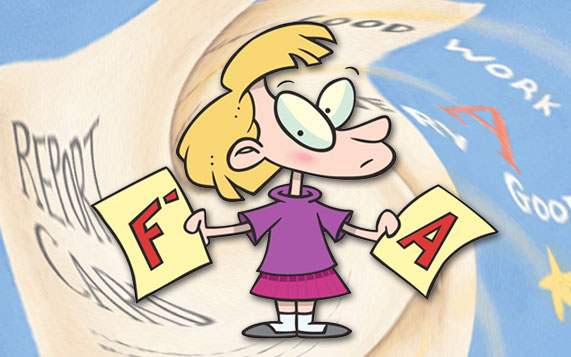 When my daughters came home with their first quarter report cards a couple weeks ago, I was prepared to see straight A’s for both of them. They have both consistently been among the highest in their classes in all subjects, and their teachers have always told us they are excellent students.
When my daughters came home with their first quarter report cards a couple weeks ago, I was prepared to see straight A’s for both of them. They have both consistently been among the highest in their classes in all subjects, and their teachers have always told us they are excellent students.
What I found when I did open the report cards was not what I expected.
First of all, the school has moved from a completely A-F grading system to a standards-based grade card. My wife, an elementary teacher, explained this change to me, and it sounds like a good idea. After all, what does an “A” or a “C” really mean? What does that really tell me about my child’s abilities? The new report card allowed me to see whether my daughters were “working towards,” “proficient” or “exceeding” standards.
The second thing that surprised me was the disparity in my girls’ grades. One daughter received all proficient or exceeds standards, while the other earned all working towards standards or proficient. I was confused. How could my children, who are both among the top performers in their classes, get such different marks?
After a couple of conversations with teachers, I figured out why there was such a difference in my daughters’ grades. It seems that one teacher was basing her grades on where children should be after the first quarter and the other teacher was basing her grades on where children should be at the end of the year.
With this understanding, my wife and I had to make sure to have careful, considerate conversations with both girls, explaining the differences in grades, and reassuring both kids that they are doing well in school.
This situation makes me think about the overall “education reform” movement that surrounds our schools, as students, teachers and administrators are inundated with new programs that must happen immediately, if not sooner. With any of the initiatives, proper planning, training, teacher input and resources are a necessity. Otherwise, no matter how educationally sound, the program will not succeed.
The Common Core illustrates this best. High standards for students to aspire to are good. However, the implementation has been a disaster. Districts are scrambling to find resources to prepare students and teachers for the Common Core. There are few clear answers about the link between an inordinate amount of high stakes tests and Common Core. Frustrations are mounting amongst teachers who are worried that the Common Core will reduce their classroom autonomy. Even the Tea Party is involved, with claims that the Common Core is a plan to indoctrinate students. If there wouldn’t have been such a rush to implement, and the proper resources would have been provided from the beginning, there would be a whole lot less backlash, criticism and anxiety.
OTES is another example. There’s no question that teachers want accountability and have no problem being evaluated. However, a hastily-made system developed by state-legislators, without proper teacher input and resources is not the answer. In the first few months of implementation, enough problems are arising that Senators Lehner and Gardner are introducing legislation to scale back the initiative, with less evaluations and less weight of student growth measures. While the education community applauds this proposal, much of the stress of OTES could have been completely avoided, if teachers and administrators would have been listened to from the onset and a educationally sound evaluation system would have been created from the beginning.
Then, there’s the third grade reading guarantee. There’s not a teacher around that doesn’t want all his/her students to read well and have strong literacy skills. However, the third grade reading guarantee creates more problems than it solves. School districts are scrambling to make sure they have teachers who are properly certified and trained in the right places to comply with the mandate. Administrators are struggling to find the necessary training and resources to prepare teachers. Teachers are stressed about servicing students on reading improvement plans (RIMP), and some are even looking to transfer to other grade levels. It’s hard to imagine that this program will be successful in increasing literacy, considering all the problems associated with it.
All parties in the education community are open to change that improves student learning and better prepares children for college and the world. However, it’s foolish, no matter how good the programs or ideas sound, to rush implementation, without adequate resources and scaffolding to support them.
By Dan Greenberg, Sylvania Education Association
